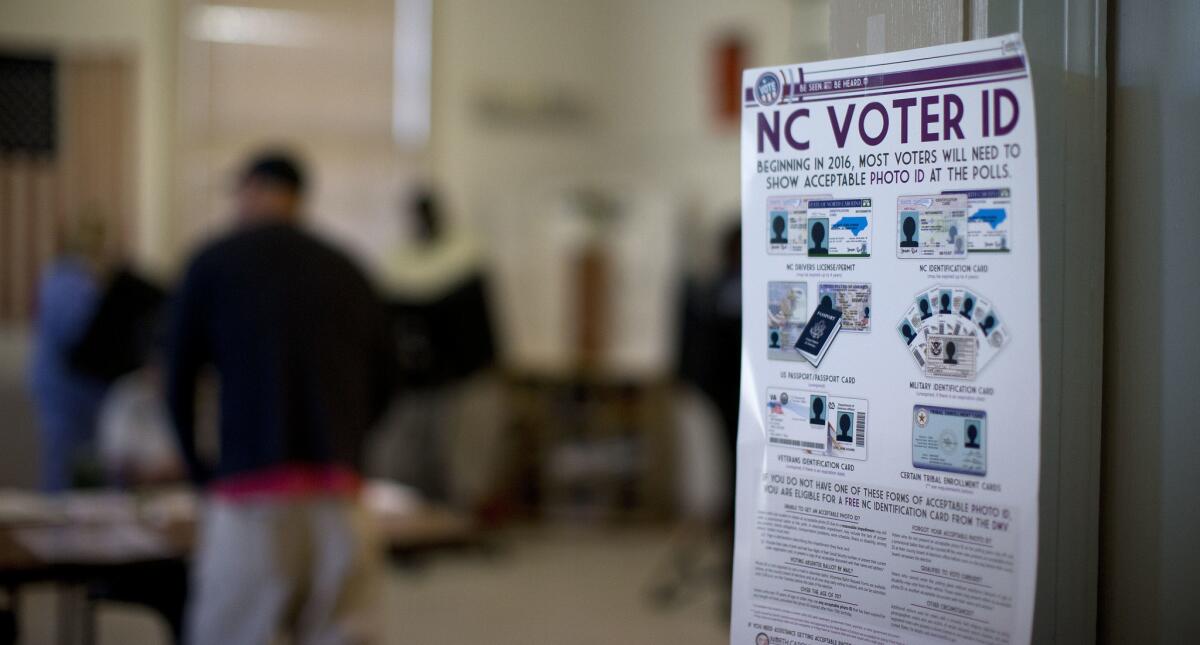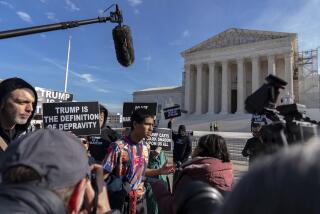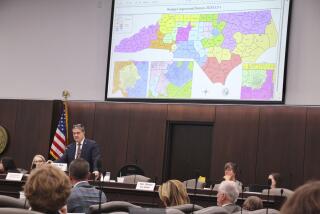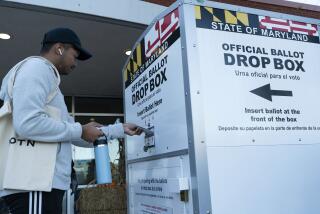Supreme Court denies North Carolina appeal to enforce its voter ID rules

The Supreme Court on Wednesday turned away an emergency appeal from North Carolina’s Republican leaders who were hoping to reinstate new voting rules that were struck down in July as racially biased.
The justices said they were deadlocked 4-4 and would not intervene, leaving in place the state’s rules for casting ballots and early voting that were used before 2013. The vote split on ideological lines.
The court’s decision is a victory for civil rights advocates and Obama administration lawyers who had challenged North Carolina’s rules as violating the Voting Rights Act. The outcome also may give a slight boost to Democrats, including Hillary Clinton, who will need strong support from minority voters to prevail in November.
North Carolina Gov. Pat McCrory, who is locked in a tight race for reelection, had appealed to the high court two weeks ago and contended his state would suffer “irreparable harm” if it could not enforce its new voter ID restrictions.

The court’s decision is a victory for civil rights advocates and Obama administration lawyers who had challenged North Carolina’s rules as violating the Voting Rights Act.
But the Justice Department urged the court to stand back and permit the November election to go forward “free from the taint of racial discrimination.”
Chief Justice John G. Roberts Jr. and Justices Anthony Kennedy, Clarence Thomas and Samuel A. Alito Jr. said they would have granted the emergency appeal. All four are Republican appointees. It takes a majority of five votes to grant such an appeal, which means that the court’s four Democratic appointees, Justices Ruth Bader Ginsburg, Stephen Breyer, Sonia Sotomayor and Elena Kagan, voted to deny the appeal.
Currently, new voters in North Carolina are required to present some form of identification, such as a driver’s license, Social Security or photo ID card, when they register. To cast a ballot at a polling place, they must provide a name, address and sign a form attesting to their identity. The signature is compared to the one on the registry.
The new law would have required further proof of their identity at the time of voting, a step that an appeals court ruled in July could prevent thousands of registered voters who do not drive a car from casting a ballot.
Allison Riggs, an attorney for the Southern Coalition for Social Justice, said the court’s decision is “in the best interest of North Carolina voters, allowing elections this fall to proceed absent the cloud and concern of racially discriminatory voting laws. Hundreds of thousands of North Carolinians will now be able to vote without barriers.”
McCrory said in a statement that North Carolina “has been denied basic voting rights already granted to more than 30 other states to protect the integrity of one person, one vote through a common-sense voter ID law.” He noted that his appeal won four votes at the high court, even though it was filed “without any support from our state’s attorney general.” He referred to Atty. Gen. Roy Cooper, a Democrat, who is running against McCrory.
North Carolina imposed the new law in 2013 after a 5-4 Supreme Court ruling struck down a key part of the 1965 Voting Rights Act. It had barred the Southern states from changing their election laws without first winning clearance from the Justice Department in Washington.
Freed from federal oversight, a state Senate leader in Raleigh immediately announced plans to revise election rules. GOP lawmakers “requested and received racial data” on how different voting rules would help or hurt racial minorities. And they then adopted, on a party-line vote, five changes to the election procedures that “targeted African Americans with almost surgical precision,” the 4th Circuit Court of Appeals found in July.
For example, they limited the acceptable IDs to those types that were “disproportionately held by whites and excluded those disproportionately held by African Americans,” the judges found. Registered voters who had a current driver’s license, a U.S. passport, a U.S. military ID or a veteran’s ID card could vote, but not those who had photo IDs showing they were a government employee, a student or receiving public assistance or whose driver’s license had expired.
And while lawmakers said they sought to prevent fraud, they did not “identify even a single individual who has ever been charged with committing in-person voter fraud,” the appeals court said. However, the bipartisan State Board of Elections saw the potential for fraud by those who mail in their ballots. The absentee ballots are used disproportionately by whites, not blacks, and armed with this information, the Legislature “exempted” the mail ballots from the new photo ID requirements, the court found.
The Legislature also learned that blacks had voted heavily during the first week of the 17-day early-voting period, particularly so on Sundays. So the new law dropped the first week of early voting, including one Sunday.
When a federal judge in North Carolina heard the legal challenge, he upheld the state’s law in a lengthy opinion. He said the lawyers for the NAACP of North Carolina, the League of Women Voters and the Justice Department failed to prove these changes would pose significant obstacles for many voters. He cited evidence that voting turnout among African Americans rose even after the new law was enacted.
But the 4th Circuit Court of Appeals based in Richmond said the judge had missed the forest for the trees. The court struck down the entire law because it had been adopted with a discriminatory intent. The Republicans who controlled the Legislature decided to “entrench” themselves, the appeals court said, by “targeting voters who, based on race, were unlikely to vote for the majority party.”
While the high court refused to allow the disputed law to be enforced this year, the state’s lawyers still may file an appeal seeking a review of the 4th Circuit’s decision.
On Twitter: DavidGSavage
UPDATES:
2:25 p.m.: This article was updated with how the Supreme Court justices voted as well as comment from the Southern Coalition for Social Justice.
This article was originally published at 12:45 p.m.
More to Read
Start your day right
Sign up for Essential California for news, features and recommendations from the L.A. Times and beyond in your inbox six days a week.
You may occasionally receive promotional content from the Los Angeles Times.







